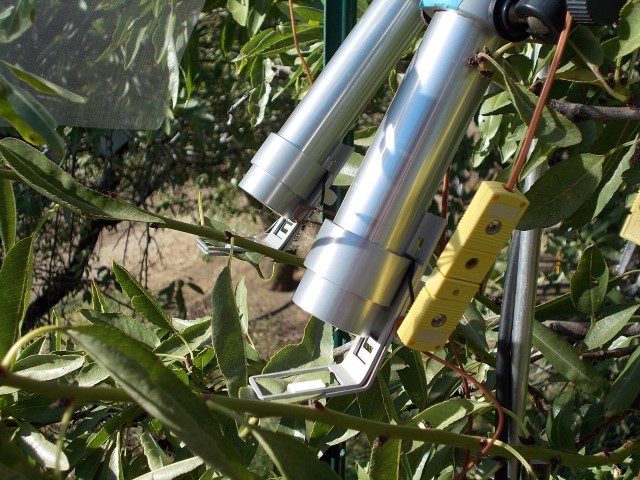
Almond industry’s research commitment adds new talent to address priorities
The Almond Board of California (ABC) has a long-term legacy of funding third-party production research through its long-term partnerships with public research institutions.As a result of this collaboration, nine new UC Cooperative Extension and UC research faculty are actively engaged in priority almond research.
September 1, 2015

The Almond Board of California (ABC) has a long-term legacy of funding third-party production research through its long-term partnerships with public research institutions, including the University of California and UC Cooperative Extension.
Since 1973, the Board’s production research committee has invested $20.3 million for 271 projects aimed at improving production efficiencies, including irrigation and nutrient management; orchard practices; pollination and bee health; integrated pest management; and much more.
The Board’s environmental committee over the last dozen years has funded another $4.7 million in research projects that enable almond growers to farm profitably while being good stewards of the land and community.
This year, the Almond Board announced a $2.5 million dollar commitment to independent, third-party research with a focus on next-generation farming practices that addresses a wide array of irrigation and water issues and continues to focus on honey bee health research.
Strategic Approach
This commitment to supporting research and research institutions, however, is not just a matter of dollars and cents. It has materialized from years of long-term strategic thinking in partnership with other California nut crop commodity groups to identify research priorities and work with public institutions to ensure research talent is available to address the needs of the industry.
Public funding for research targeted at agricultural productivity stagnated nationally starting in the 1980s and California was no exception.
However, administrators with the UC Division of Agriculture and Natural Resources (UCCE) and the University of California, specifically the UC Davis College of Agricultural and Environmental Sciences (CAES), have worked with agriculture and other stakeholders to hire research and Extension professionals to serve California agriculture, particularly almonds.
With this in mind, the California almond, walnuts, and pistachio industries, worked together to identify priority research and Extension faculty needs, and worked with UCCE and the UC Davis CAES to fill these positions.
As a result of this collaboration, nine new UC Cooperative Extension and UC research faculty are actively engaged in priority almond research.
New positions
The new UC and Cooperative Extension researchers hired from 2013-2015 are already engaged this year in high-priority ABC-funded research. These researchers and their targeted research areas include:
Florent Trouillas - UC Kearney Ag Research Center – improving the diagnosis and management of trunk and scaffold canker diseases.
Andrea Joyce - UC Merced - improving the management of leaffooted bugs.
Matthew Gilbert - UCD Plant Sciences - new techniques to monitor tree plant water status and assessing the heat tolerance of almond breeding stock.
Astrid Volder - UCD Plant Sciences – determining how varying irrigation practices, patterns, and levels impact fine root growth and development.
Helen Dahlke – UC Davis - assessing the potential impact and benefit of groundwater recharge in almond orchards.
Maciej Zwieniecki - UCD Plant Sciences - investigating how erratic temperatures during dormancy impact carbohydrate use and depletion of tree reserves.
Georgia Drakakaki - UCD Plant Sciences - using novel microscopic and biotechnology tools to assess salinity tolerance in almonds and rootstocks.
Andreas Westphal - UC Kearney Ag Research Center - screening developmental rootstocks for nematode resistance and tolerance.
Amélie Gaudin - UCD Plant Sciences - investigating the nature of symbiotic relationships between naturally occurring mycorrhizal fungi and almond roots, and then determining the potential of mycorrhizal fungi inoculation to reduce water stress in almonds.
New support for almonds
The Almond Board’s legacy of, and long-term commitment to supporting research and research institutions by funding almond research, has paid off with filled positions and new talent to address almond research projects.
This strategic action on behalf of almonds and other nut crops helps assure the future of a very productive partnership between UC and almonds that has contributed to the growth and success of the California almond industry and the advancement of sustainable almond practices that are cost-effective, and environmentally and socially responsible.
For the latest on western agriculture, please check out Western Farm Press Daily and receive the latest news right to your inbox.
You May Also Like



